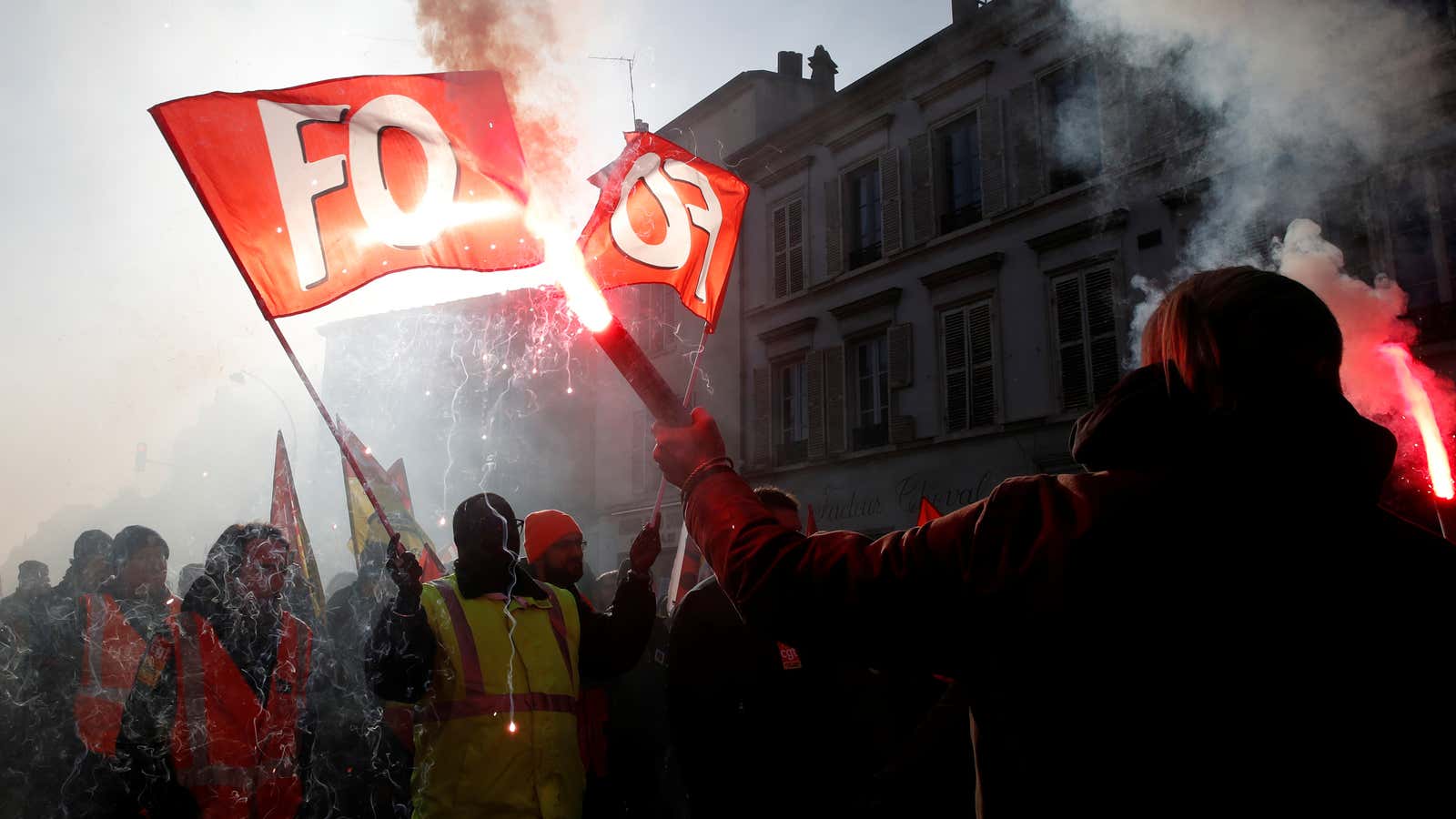If you had to describe the state of the economy in an emoji, it’d be: 🤷
No one is quite sure what will happen in 2020, partly because of all the looming political uncertainty. There’s the trade war, US-China relations, US-Iran relations, the US election, the rise of populism, Brexit (still), protests around the world, and the question of what governments will or will not do to combat climate change. That’s the short list.
All of that uncertainty should be a drag on the global economy because it gives companies a reason to delay hiring and investment, and there’s some evidence that that’s happening. However, some experts have been surprised just how little impact it’s had on the economy to date. In a year that promises to be full of political turbulence, can the economy keep calm and carry on?

Uncertainty everywhere
Perhaps the simplest index for tracking uncertainty comes from researchers at the IMF and Stanford University. They count up mentions of the word “uncertainty” or variants thereof in reports from the Economist Intelligence Unit, an economic research firm, for 143 countries going back to 1996. The result, after a few adjustments, is an index of uncertainty around the world:
Nicholas Bloom, an economist at Stanford and one of the researchers behind the measure above, maintains another index that tracks mentions of the word “uncertain” alongside a series of words related to economic policy in major newspapers and in different countries. The global version of this index is near all-time highs as well.
And in late 2019, Bloom and his IMF colleagues Davide Furceri and Hites Ahir released a trade-specific version of their simpler measure. They counted up mentions of “uncertainty” in Economist Intelligence Unit reports, but specifically looked for ones that were mentioned near a list of other words related to trade like “protectionism” and “tariff.” This measure of trade uncertainty is, unsurprisingly, at new highs, too.

Does policy uncertainty matter?
Olivier Blanchard, a senior fellow at the Peterson Institute for International Economics and the former chief economist at the IMF, was struck by the fact that, despite the trade war, populism, and global protests, “the world economy is kind of doing OK.”
How can we have so much political and geopolitical uncertainty and so little economic uncertainty?
— Olivier Blanchard (@ojblanchard1) January 24, 2020
Adding to Blanchard’s case is the fact that the VIX, a measure of expected stock market volatility in the US, has been fairly low throughout the Trump era, a sign that political uncertainty isn’t creating economic uncertainty.
“The effects of uncertainty, which is a very fashionable topic in research, may be weaker than we thought,” he told Quartz. “Governments don’t have quite the effect they say they have on the economy, in general,” he offered by way of explanation. As for tariffs and trade wars, he said they can be “very bad for the medium run… but you don’t get big recessions out of that.”
But all this uncertainty does carry at least some cost.
“Anticipation of Brexit is estimated to have gradually reduced investment by about 11% over the three years following the June 2016 vote,” wrote researchers in one paper estimating the effect of uncertainty on the UK economy. (That paper used survey data, rather than mentions in news or economic reports, to measure uncertainty.)
And, in a working paper published earlier this year, Bloom and several colleagues took their measure of uncertainty in US news articles and showed that it closely tracked the VIX. The point of that exercise was to see what other words and topics were mentioned in the articles that corresponded to market volatility. They found that 44% of those articles mentioned commodity markets, for example, and 8% mentioned financial crises.
The researchers also found that articles mentioning government and policy were becoming more important for their VIX-tracking measure over time. In other words, more and more volatility in the market seemed to be attributable not to economic conditions but to government policy.
(Past spikes in policy-related uncertainty often involved wars. Until recently, the researchers say, trade policy was not a factor.)
One problem with all of this research into uncertainty is that it’s tough to disentangle uncertainty itself from the changes that come with it. The Brexit vote, for instance, raised uncertainty and also increased the likelihood of a policy outcome that lots of experts and businesses thought would be damaging. In cases like that it’s hard for researchers to separate reactions to policy uncertainty from reactions to plain old bad policy.
Oddly enough, even though policy seems to have been a bigger driver of economic uncertainty over time, text-based measures of uncertainty haven’t tracked the VIX as tightly since 2016. “Trump is like a one man policy-uncertainty machine,” Bloom said. Yet, the US stock market hasn’t been particularly volatile while he’s been in office. This disconnect is part of why Bloom and his colleagues created the simpler index based on the Economist Intelligence Unit’s reports. If the problem was that the media was hysterically over-reporting on Trump, that’d be less likely to show up in the more sober EIU reports. But that index showed a major spike in uncertainty, too.
Maybe the Trump era has taught investors how little the economy depends on the political news of the day. Or, maybe the market has developed a false sense of security. Either policy uncertainty and bad policy just don’t matter as much as many people thought, or they do but investors have decided to look the other way.
